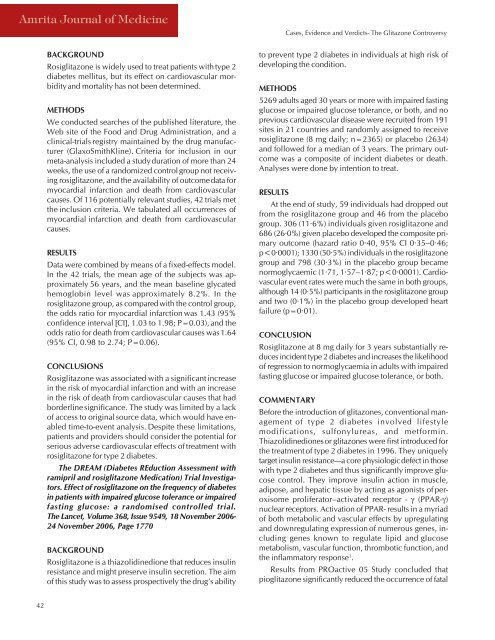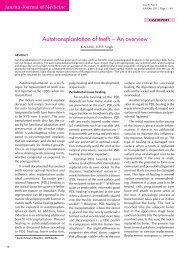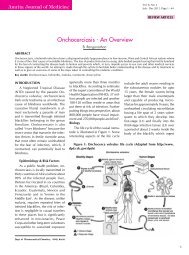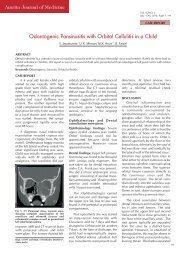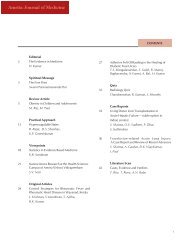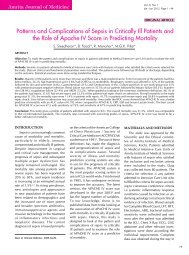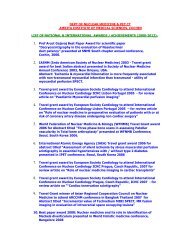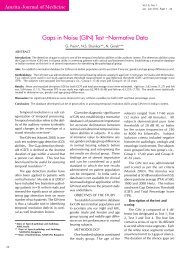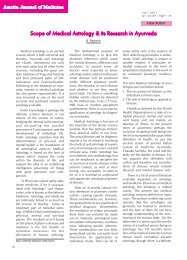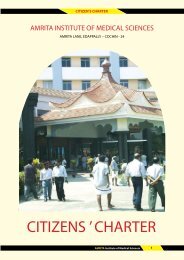Journal of Medicine Vol 4 - Amrita Institute of Medical Sciences and ...
Journal of Medicine Vol 4 - Amrita Institute of Medical Sciences and ...
Journal of Medicine Vol 4 - Amrita Institute of Medical Sciences and ...
Create successful ePaper yourself
Turn your PDF publications into a flip-book with our unique Google optimized e-Paper software.
<strong>Amrita</strong> <strong>Journal</strong> <strong>of</strong> <strong>Medicine</strong><br />
Cases, Evidence <strong>and</strong> Verdicts- The Glitazone Controversy<br />
BACKGROUND<br />
Rosiglitazone is widely used to treat patients with type 2<br />
diabetes mellitus, but its effect on cardiovascular morbidity<br />
<strong>and</strong> mortality has not been determined.<br />
METHODS<br />
We conducted searches <strong>of</strong> the published literature, the<br />
Web site <strong>of</strong> the Food <strong>and</strong> Drug Administration, <strong>and</strong> a<br />
clinical-trials registry maintained by the drug manufacturer<br />
(GlaxoSmithKline). Criteria for inclusion in our<br />
meta-analysis included a study duration <strong>of</strong> more than 24<br />
weeks, the use <strong>of</strong> a r<strong>and</strong>omized control group not receiving<br />
rosiglitazone, <strong>and</strong> the availability <strong>of</strong> outcome data for<br />
myocardial infarction <strong>and</strong> death from cardiovascular<br />
causes. Of 116 potentially relevant studies, 42 trials met<br />
the inclusion criteria. We tabulated all occurrences <strong>of</strong><br />
myocardial infarction <strong>and</strong> death from cardiovascular<br />
causes.<br />
RESULTS<br />
Data were combined by means <strong>of</strong> a fixed-effects model.<br />
In the 42 trials, the mean age <strong>of</strong> the subjects was approximately<br />
56 years, <strong>and</strong> the mean baseline glycated<br />
hemoglobin level was approximately 8.2%. In the<br />
rosiglitazone group, as compared with the control group,<br />
the odds ratio for myocardial infarction was 1.43 (95%<br />
confidence interval [CI], 1.03 to 1.98; P=0.03), <strong>and</strong> the<br />
odds ratio for death from cardiovascular causes was 1.64<br />
(95% CI, 0.98 to 2.74; P=0.06).<br />
CONCLUSIONS<br />
Rosiglitazone was associated with a significant increase<br />
in the risk <strong>of</strong> myocardial infarction <strong>and</strong> with an increase<br />
in the risk <strong>of</strong> death from cardiovascular causes that had<br />
borderline significance. The study was limited by a lack<br />
<strong>of</strong> access to original source data, which would have enabled<br />
time-to-event analysis. Despite these limitations,<br />
patients <strong>and</strong> providers should consider the potential for<br />
serious adverse cardiovascular effects <strong>of</strong> treatment with<br />
rosiglitazone for type 2 diabetes.<br />
The DREAM (Diabetes REduction Assessment with<br />
ramipril <strong>and</strong> rosiglitazone Medication) Trial Investigators.<br />
Effect <strong>of</strong> rosiglitazone on the frequency <strong>of</strong> diabetes<br />
in patients with impaired glucose tolerance or impaired<br />
fasting glucose: a r<strong>and</strong>omised controlled trial.<br />
The Lancet, <strong>Vol</strong>ume 368, Issue 9549, 18 November 2006-<br />
24 November 2006, Page 1770<br />
BACKGROUND<br />
Rosiglitazone is a thiazolidinedione that reduces insulin<br />
resistance <strong>and</strong> might preserve insulin secretion. The aim<br />
<strong>of</strong> this study was to assess prospectively the drug’s ability<br />
to prevent type 2 diabetes in individuals at high risk <strong>of</strong><br />
developing the condition.<br />
METHODS<br />
5269 adults aged 30 years or more with impaired fasting<br />
glucose or impaired glucose tolerance, or both, <strong>and</strong> no<br />
previous cardiovascular disease were recruited from 191<br />
sites in 21 countries <strong>and</strong> r<strong>and</strong>omly assigned to receive<br />
rosiglitazone (8 mg daily; n=2365) or placebo (2634)<br />
<strong>and</strong> followed for a median <strong>of</strong> 3 years. The primary outcome<br />
was a composite <strong>of</strong> incident diabetes or death.<br />
Analyses were done by intention to treat.<br />
RESULTS<br />
At the end <strong>of</strong> study, 59 individuals had dropped out<br />
from the rosiglitazone group <strong>and</strong> 46 from the placebo<br />
group. 306 (11·6%) individuals given rosiglitazone <strong>and</strong><br />
686 (26·0%) given placebo developed the composite primary<br />
outcome (hazard ratio 0·40, 95% CI 0·35–0·46;<br />
p


